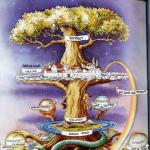Why don't people appreciate the good you do for them?
The question is, of course, interesting. On the one hand, they, such radishes, simply get used to it and begin to take this goodness for granted. On the other hand, is good really such goodness if we begin to expect gratitude in return? Ideally, both those who receive should be grateful and those who give should be selfless. But life in general is unfair. There are different options here. Become Mother Teresa and do good to everyone just like that. Or become a complete egoist and do nothing to anyone at all. Or become a mercantile pragmatist and do good only to those who will give something in return. Or even more mercantile - do good only in response to good. I myself look at the circumstances - give or take. And I don’t worry much about people. As it is, no one is perfect.
When a person does good, he first thinks with his heart, because it’s a shame and something needs to be done, and then over time, when the person to whom he did good becomes obsessive and arrogant, then he thinks with his head, but fortunately there are few ungrateful people. And no one forces us to do good, we just do it ourselves, so as not to worry later - we could have helped and did not help.
Well, it’s like they say: If you’ve done something good, move away so that you don’t get caught up in a wave of gratitude. People are essentially ungrateful. Let me give you an example: my uncle was kicked out of the house empty-handed, his daughters immediately said that they didn’t need him because they had their own families, but we thought and decided that it was impossible to leave a person in trouble. They gave him a room, bought him clothes, and helped him with his work. What have we achieved? Every day he comes drunk and makes scandals for us, plus he once raised his hand, but there is nowhere to kick him out. Conclusion: where is the banal gratitude? In such a situation, you don’t expect it, but you expect the person to behave like a human being. The same as: The road to hell is paved with good intentions. Help for the soul is better when you help children from a shelter, or people affected by a fire - we do it selflessly and don’t expect anything in return, but it’s so nice to know that these people are praying for you and your children. And you don't need more. Therefore, not everyone is ungrateful, but unfortunately the majority are.
Those who are not accustomed to give thanks do not appreciate goodness. Everything comes from childhood. Some people don’t even dare say thank you. Most people take good deeds and actions for granted. But still, the expression to do good does not imply the same good in return. A person should not expect to be thanked for his good deeds. In this case, a commodity relationship arises, called Dash on Dash. They do not seek good from good.
A person, when making any decision, is guided by a rational or ethical approach. These approaches are opposed to each other. In nature, everything happens cruelly, but rationally. Man, due to his development relative to other species, has complicated everything so much that he has come up with all sorts of ethical concepts such as goodness and justice. Rationality, in my understanding, is when a person receives something in return for his actions. Ethics - when a person does not consciously receive benefits, it is a refusal to fight. By sacrificing something, everyone thereby violates the natural laws of nature (slows down, perhaps, and breaks the chain of cause and effect intended by nature with his inventions), and if we collect all these sacrifices together, then this will be the force that keeps human society from self-destruction . When a group of people acts rationally more often, it ends up gaining greater opportunities, more influence, harnessing the colossal forces of nature and acting in unison with them. But at the same time they themselves become hostages of the structure that they gave birth to. For example, oligarchs are victims of capital. Victims in the sense that their entire essence is aimed at reproducing pieces of paper. It is unlikely that any of them will become a scientist or a person of art. Many of the criminals believe that they have understood life - but in fact, only one of them possible ways e live. It turns out that our life is a flow of energy (sun->plants->animals->people->the meaning of people’s lives?). Once it began, one day it will end. (The Sun arose as a result of cosmic processes unimaginable in scale, and only relative calm in our solar system created the conditions for the development of complex structures, such as carbon-based life forms) A rational approach accelerates this flow, and it becomes destructive - it can destroy everything in its path if it is not stopped (like a nuclear reaction). People call it Evil. An ethical approach slows down this flow and it is customary to call it Good. (slow nuclear reaction - nuclear power plants, science, art, music) For example, in a military conflict, everyone acts rationally, assessing the risks, calculating the enemy’s steps in advance, but in the end they suffer huge losses, often not comparable to the benefits of winning. And only a compromise, when both parties sacrifice part of their interests, leads to a quiet resolution of the situation (a calm flow of energy). This almost never happens in the animal world (a hungry predator will not allow the prey to continue to exist, ethically dooming itself to death. He acts according to his instincts, according to nature. And among people there are cases of cannibalism in a hopeless situation - this is a completely rational approach).
Returning to the question... When we do good, in fact, we often act rationally. We get something for this: recognition by society, awareness of our holiness, expectation of reciprocal help (in the future) from this person. It just might be intangible things or investments, which will create the appearance of gratuitousness. Please do not be offended, but if you think that your goodness is not valued, then this is similar to a situation where you did not discuss the terms of the contract and did not come to a mutual agreement regarding it)) You have done your part, and your partner may not know what you are waiting for in return. You need to communicate more in such cases, explain your position, because many things are conveyed non-verbally (even if they are not explicitly spoken). Only holy people are capable of real (free) Good. This sounds paradoxical, but for real Good they receive suffering (due to the fact that they go against the laws of the universe) and the energy that they suspend seems to hit them.
So, if you do good and feel that people do not value you, there is nothing wrong with explaining to the person the essence of your actions and expectations. If it doesn’t matter to you that a person did not thank you (do good and throw him into the water), while all the troubles of the world fall on you, then it is possible that you are following the path of a saint and, I would not like to upset you, but with this approach your affairs will be only get worse)
This is the law of meanness. do not do good to a person - you will not receive harm
Good presupposes selflessness and sincerity, but people either do not trust, or look for a catch everywhere, or simply do not understand the meaning of actions, and pay with ingratitude and evil. The fact is that help pampers people, dampens them, gives them the feeling that this is how it should be, that this goes without saying, so why value a person if he is so stupid, let me do something nasty to him.
People themselves can be ungrateful, with a wormhole, therefore they are angry at the whole world, incapable of creating good.
It seems to me that you idealize people and at the same time suffer from the fact that your thoughts about people’s behavior do not coincide with their real way of acting. Yes, unfortunately, people often behave not only ignoble, but also tactlessly, unscrupulously, arrogantly, and cynically. If you are inclined to sincerely help people, then you should not worry about their response, let it remain on their conscience. And if you are offended by the fact that you are paid with sheer ingratitude, then you won’t have enough nerves. You should accept human weaknesses and shortcomings as a given and continue to do good deeds to the best of your ability.
You know, you start doing something because you sincerely want to help, and not so that they will say thank you and begin to appreciate you. Don't expect this from people. There are people who are not grateful, so be it. This is their conscience, and you live according to your conscience.
Because they are like that, they have not yet passed the stage of life that would teach them to appreciate the good that another person gives them free of charge. But don’t worry about these people, life will definitely teach them sooner or later. First on frivolous events, then on more serious ones. Because a person should be grateful.
Why don’t men appreciate kind and caring women. How many times have I noticed this... 🤔. Is this really a drawback? If a woman has a good heart, this does not mean that she is stupid or naive. She has everything - career, leisure, hobbies, she is her own boss. At some point, such girls come to the conclusion that they no longer want to change their lives.
A good girl strives to find a partner for life and create a strong relationship. She is waiting to meet a man who will become her best friend.
She is looking for someone who will accept all her flaws and shortcomings and surround her with love and care. Such a girl does not view relationships as a game and does not manipulate guys.
Her kind heart doesn't make her weak, it helps her forgive and give people a second chance.
She sees only the good in those around her. Every person has the right to make a mistake - that’s what she thinks. We've all done things that we later bitterly regretted, the main thing is that we learned a lesson from it. Everyone has the right to start life with a clean slate.
A good girl is guided not by rules, but by intuition. She will not allow a man to tell her how to live, she loves herself the way nature created her. She considers her kindness to be a blessing from above.
She knows that kindness sometimes brings more problems and worries than happiness, but does not change her attitude towards people.
She knows that others seem strange, as if out of this world, but she doesn’t care, she’s always one step ahead.
Her path is the path of spirituality. She trusts the Universe and sees the blessing of heaven in every moment. In the most difficult situations, she remains true to herself and her views.
Even if they mock her, she will not repay evil for evil. Kindness is her weapon. How do you feel about girls who seem good to others, but never find a partner?
Let's talk. You will object to me - how much they value it! But this is not entirely true - a man values any woman’s actions exactly as long as he values the woman herself. Just like with children. As long as the mother loves them, she loves the children too. And after the divorce, remember the name and alimony through the court. Therefore, do not rush to give a man all of yourself, especially in the hope that he will notice this, and that the memory of your merits at the fateful moment will keep him close. At the same time, I do not dissuade you from acting at the behest of your soul and helping or supporting a man when you see fit. Just do it because your conscience tells you to, without expecting gratitude. If he appreciates it, it’s great, but if he doesn’t, it’s ce la vie.
As I have written many times, it is very important for a man to be good - even when he commits outright bad acts. Therefore, his “task” is to shift the responsibility onto the woman as much as possible. I cheated - you didn't pay enough attention to me. He insisted that he didn’t want children, and at the age of 50 he “made” a child with his mistress and left for her - you should have better convinced me of the need for children and in general you yourself didn’t want it. Or here's another example. The husband suffered a stroke, the wife looked after him, found doctors, took out a loan to get him into a good position. rehabilitation center. When he recovered, he went to his mistress, who appeared before his illness (his wife did not know). To all the questions, “How is this possible?!”, he answered, “I didn’t ask you to look after me.” And you can’t argue, except from a moral point of view.
While I was writing the article, I found the story of a girl who was married as a virgin. I thought that my husband would appreciate it - he was so happy about it. "I had the first the wedding night, after the wedding. Almost 10 years later there was a very difficult divorce. To my words... how could you cheat on me with no one and not when... there was an answer... and who asked you. It was like an ice cold shower."
Tell these stories to men outside the context of the article and you will see that most of them will not understand the problem and will answer the same way - well, he didn’t ask... Yes, even if he asked, a man will always find a way to turn the matter in his favor.
There's another one interesting feature- a man remembers only your last action. What does it mean, usually “negative”. He will take the positive for granted, but God forbid he refuses you anything. All your previous support, the help of a fighting friend, the fact that you were there in the most difficult moments, etc. will be forgotten at the first opportunity when you cannot, do not want, or do not have the strength to do something else for him again. However, at every opportunity he himself will remember how 3 years ago he gave you 50 thousand rubles for a new handbag and will present it as if he does it almost every week. These 50 thousand 3 years ago will become his calling card, the answer to all your complaints. Your actions are what you are obligated to do anyway. His is the triumph of a hero, applause and a laurel wreath.
So Why don't men appreciate being treated well?? I have already mentioned the first reason. The memory of your merits will limit him, prevent him from doing what he wants, but what you won’t like. Therefore, it is easier to forget or present it as your good will, which he did not ask for, or another option is to say that you, as a wife, were already obliged to do this, there is nothing special about it. And it doesn't matter what it cost you. After all, we are not talking about washing dishes or “in sickness and in health,” but about life-defining moments, such as the birth of children or large financial obligations and risks, where you sacrifice something for the sake of a man. That is why you should always think only about yourself first. Or, as my elderly friend said, “never tell your husband all your secrets, don’t give in on everything, don’t expect that he will appreciate and respond in kind.” I would add - and never feel sorry for a man if we are not talking about momentary experiences or objective troubles. It’s not a fact that he will regret you later. As long as everything is fine in your family, you will have no reason to doubt, but as soon as the marriage cracks or problems arise, you may be bitterly disappointed.
The second reason, Why don't men appreciate being treated well? the fact that they take the vast majority of actions for granted. The wife will tell her friends for a long time how her husband brought her oranges to the hospital almost every day, how he cared, how great he was, not like others. A man will perceive a similar situation as completely natural. Maybe he will brag to his friends, but in fact he will react very calmly, or even notice that you could pay more attention.
Another reason is boundary testing. Subconsciously (and not really) a man wants to know to what extent he can “use” a woman. Not in terms of banal and cynical use, but in everyday life. Where is the line that you can’t cross, otherwise you’ll get a response. If a wife gave a large amount of money a couple of times, how many times can she give the same amount or more? How long will she tolerate my “quirks” before giving the final warning? To be fair, I will say that not only men do this, women no less.
Therefore, through good relationship a man cannot be conquered. You give him affection, borscht, good sex, comfort, clean floors - but he doesn’t need that. This is a hymn of love for you, but for him it is nothing more than pleasant, but not even very necessary little things. To a much greater extent, he needs a female partner nearby, equal in level to him. Or a “hot thing” with character. And he will eat borscht in a restaurant - especially since it tastes better there...
And lastly, perhaps you are simply imposing your idea of \u200b\u200bgood on a man. It seems to you that you are caring, but it seems to him that you are intrusive. It’s not really his fault anymore. You can’t instill your own beliefs about happiness in another person; it’s better to understand what he needs specifically.
Why is it that many people consider those who often “give others a hand” in difficult times as soft-hearted romantics, at the expense of which you can arrange your own life comfortably?
What to do if you think that people should be helped if they need help, but at the same time you don’t want to look like a weakling in other people’s eyes?
What do we mean by kindness?

Kindness- this is not only the ability and desire to support someone in a difficult situation, but also a positive attitude that a person subconsciously strives for under any circumstances.
This does not mean that he walks around around the clock with a smile on his lips.
Some good-natured people may have a far from friendly facial expression, but their hearts, as they say, are big, and is capable of giving warmth to those in need of support.
In other words, we can say about kindness that these are various manifestations of the characteristics of human character, which truly has moral qualities and capable of empathy for others.
Kindness can manifest itself in the form of:

Why is it difficult for good people to live?

This happens if fate decides in such a way that a philanthropist is surrounded only by mercantile individuals, unscrupulously exploiting him and not intending to leave the person the opportunity to spend resources on his personal tasks.
The life of such a good-natured person can be similar to the duty schedule of an ambulance crew.
That is there are always sufferers, but there is no time to drink tea, relax and, in a figurative sense, look out the window or do something for yourself.
And if in the case of doctors they at least have a salary, then philanthropists very often have only internal comfort from the feeling that they did the right thing and at the behest of their heart. But often there is no time for yourself. And resources too.
A person may suffer for his own responsiveness for the following reasons:

Why don't people appreciate this quality?

Main reason: Some individuals quickly forget that good deeds are not a mandatory action, but are a manifestation of the purely will of an assistant who has decided that someone should and should lend a hypothetical shoulder.
Besides:

Who owns the quote: “Kindness is mistaken for weakness, and rude behavior is taken for a demonstration of strength.” What to do for those who want be kind but not weak?
Be prepared that for a long time it will be difficult for you to restrain yourself and not rush to the call of everyone who asks for help.
But it’s worth learning to distinguish between empty requests and the voice of someone in real trouble. If only because there will be more energy and time to save the latter.

Beecher Henry Ward said that kindness is often mistaken for weakness, and rude behavior for a demonstration of strength. However, according to him, the greatest advantage of the strong is to use his physical or spiritual superiority in in the right key and direction.
It is said quite aptly, succinctly and as expected from religious figure, well known in America in the century before last.
And if there is a fire burning within you, the heat of which is enough for many others, do not be afraid to share it. But try not to waste it on people who only seem to be in a difficult situation.
Why is good reciprocated with evil?





